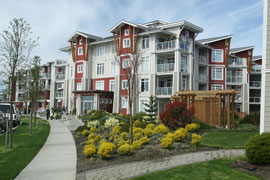Local Real Estate Markets
Local Real Estate > Home Buying • Home Selling • Category List
Real Estate Markets • Remodeling For Resale • Location Factor
 While a basic rule of thumb is that property values always go up, if you
are going to make a successful real estate investment, you need to know a
bit more than that. In fact, getting a good understanding of your
local real estate market is the best defense in ensuring that the buys
you make are smart — and profitable.
While a basic rule of thumb is that property values always go up, if you
are going to make a successful real estate investment, you need to know a
bit more than that. In fact, getting a good understanding of your
local real estate market is the best defense in ensuring that the buys
you make are smart — and profitable.
You've most likely heard the terms "buyer's market" and "seller's market." And basically, they are exactly what they sound like. A buyer's market is a market in which supply exceeds demand, while a seller's market is a market in which demand exceeds supply.
 What's interesting about the housing market is that no two areas are
exactly the same. This is because things like local job growth, income
growth, mortgage rates, and net migration all factor in to the local
housing market. When bidding on a home, it's important to get a "feel"
for the area's housing market, as well as a "feel" for the value of the
home. Determining how a home is priced is relatively easy, because all
you need to do is look at a list of comparable homes, and see what they
have recently sold for. This will tell you whether the home you are
looking at is underpriced, overpriced, or fairly priced.
What's interesting about the housing market is that no two areas are
exactly the same. This is because things like local job growth, income
growth, mortgage rates, and net migration all factor in to the local
housing market. When bidding on a home, it's important to get a "feel"
for the area's housing market, as well as a "feel" for the value of the
home. Determining how a home is priced is relatively easy, because all
you need to do is look at a list of comparable homes, and see what they
have recently sold for. This will tell you whether the home you are
looking at is underpriced, overpriced, or fairly priced.
You'll also want to know whether you are in a buyer's, seller's, or balanced market, as that will tell you how to bid. As a rule of thumb, if you are in a buyer's market you can probably underbid. If you are in a seller's market, where demand exceeds supply, you may need to bid slightly more if you are competing with many other buyers for the same home. If you are in a balanced market, chances are your bid should weigh in right around the asking price.
One of the keys to successfully investing in real estate is to purchase in areas where prices and property values are headed up. Of course, you'll need to know what influences real estate's projected future value.
First of all, consider the population of the area. As a general rule, the higher the population, the higher the demand for housing. Places to which people migrate — for example, popular retirement communities — have rising home prices, while areas that people leave — because of high crime rates or lack of jobs, for example — have falling housing prices. Areas where people are younger also tend to have rising markets, as younger people have children and increase the internal population.
Local markets with higher than average median incomes also experience healthier real estate markets. Why? Because as income rises, so does the demand for housing. As people's incomes go up, they trade up, buying the property they desire.
Local markets with robust job markets are much more likely to have a healthy housing market than those with high unemployment rates. This is because people tend to migrate to areas with jobs, increasing the demand for housing. On the other hand, people leave areas without jobs, which causes an excess of housing supply.
 Basically, if the cost of buying a home rises, demand will fall, and vice
versa. The four factors that influence property ownership are mortgage
rates, settlement costs, and mortgage product offerings, as well as tax
and government subsidies.
Basically, if the cost of buying a home rises, demand will fall, and vice
versa. The four factors that influence property ownership are mortgage
rates, settlement costs, and mortgage product offerings, as well as tax
and government subsidies.
When it comes to mortgage interest rates, whether they are low or high can determine whether people are able to buy homes. A small, one percent decrease can have throngs of people suddenly able to buy a home, while a one percent increase can price those same people right out of the housing market. A rise in settlement costs can also make home buying prohibitive for many people. Two things that have encouraged home purchases, on the other hand, are the wide variety of mortgage products on the market, as well as tax and government subsidies.
For news and information about the national real estate market, visit CNN Money - Real Estate, and for current information about local real estate conditions, visit HouseHunt News. Real estate investors will appreciate the Wall Street Journal articles about real estate market trends.
Understanding the local real estate market, and its supply and demand factors, is the first step to becoming a savvy real estate investor. Get an in-depth understanding of the area's market by looking into factors like population, jobs, and the area's real estate inventory, as well as what kind of new residential construction is in the works.